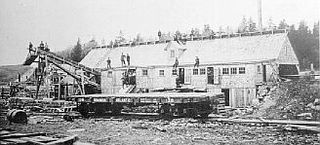Dominion Atlantic Railway Digital Preservation Initiative - Wiki
Use of this site is subject to our Terms & Conditions.
Difference between revisions of "Bangor Sawmill"
Dan conlin (talk | contribs) |
Dan Conlin (talk | contribs) (→History: 2024 fire) |
||
| (4 intermediate revisions by 2 users not shown) | |||
| Line 3: | Line 3: | ||
==History== | ==History== | ||
| − | + | A number of factors made the village of Bangor a focus for sawmill activity, including the proximity of the nearby forests and the Meteghan River, which was important for transporting the logs from the forest to the mills. The first mill at the site sawmill was built by Timothy Boudreau of Weymouth with Joseph Maillet in 1877 and powered by steam. It was purchased by the Parker Eakins Company of Yarmouth in 1880. They added a "Little Giant" water turbine made in Picton, Ontario. The mill was usually known by the name of the manager who ran it, so over the years it mill was variously called the Raymond, Hilton, Deming, Saulnier and Comeau Mill. A 2,100 foot spur was constructed about 1890 to connect the mill to the DAR mainline just east of the [[Meteghan Station]]. Flatcars loaded with lumber were loaded at the mill and moved to Meteghan Station for pick up by trains delivering them to [[Yarmouth]] for export. Mill operators sometimes economized by using oxen to shunt loaded flatcars from the mill to the Station. The mill was still shipping 20 to 30 carloads per year on the DAR in the late 1960s. The mill burned on two occasions but was reconstructed on the same site each time. The present structure dates to 1929. The final owner was Thomas Comeau who bought the mill from the Parker Eakins Company. He converted it to diesel power, but fortunately kept the water turbine as a back-up power source, making the mill one of the last working water powered saw mills in Canada. The mill closed in the 1980s but was restored and opened as a museum in 2001. The restored mill was destroyed in a fire on June 8, 2024.<ref>[https://www.cbc.ca/news/canada/nova-scotia/digby-county-historic-sawmill-destroyed-fire-1.7229237 "N.S. community 'devastated' by loss of historic sawmill, museum", ''CBC News'', June 8, 2024]</ref> The turbine and dam survived and there are hopes that the mill can be rebuilt.<ref>[https://www.cbc.ca/player/play/video/9.6422185 "Neighbours look to rebuild Bangor Sawmill Museum", ''CBC News'', June 14, 2024]</ref> | |
==Gallery== | ==Gallery== | ||
| Line 16: | Line 16: | ||
==Footnotes and References== | ==Footnotes and References== | ||
| + | |||
| + | Denise Comeau-Desautels, ''Bangor, Nouvelle-Ecosse - Sur la rivière au fil du temps'', Claire: L'Imprimerie Lescarbot/Le Courrier de lat Nouvell-Ecosse, 2011. | ||
| + | |||
Barbara Robertson, ''Sawpower: Making Lumber in the Sawmills of Nova Scotia'', Halifax: [[:Category:Nova Scotia Museum|Nova Scotia Museum]] and Nimbus Publishing, 1986. | Barbara Robertson, ''Sawpower: Making Lumber in the Sawmills of Nova Scotia'', Halifax: [[:Category:Nova Scotia Museum|Nova Scotia Museum]] and Nimbus Publishing, 1986. | ||
| Line 23: | Line 26: | ||
==External Links== | ==External Links== | ||
| − | [ | + | [https://www.facebook.com/groups/1436648763837311 Bangor Mill Museum Facebook Page] |
| + | |||
| + | [https://3dwarehouse.sketchup.com/model/a6be2760486b219286dd3e146a458c78/Le-Moulin-de-Bangor?hl=fr 3-D Graphic Model of Bangor Mill] | ||
| − | [http:// | + | [http://www.chapelhillbob.com/mill/mill_tour.htm Bangor Sawmill Museum images by Bob Davidson] |
[[Category:Commerce and Industry]] | [[Category:Commerce and Industry]] | ||
[[Category:Subdivision Yarmouth|Y568]] | [[Category:Subdivision Yarmouth|Y568]] | ||
Latest revision as of 06:06, 25 June 2024
Mile 56.83 at Meteghan on the Yarmouth Subdivison
History
A number of factors made the village of Bangor a focus for sawmill activity, including the proximity of the nearby forests and the Meteghan River, which was important for transporting the logs from the forest to the mills. The first mill at the site sawmill was built by Timothy Boudreau of Weymouth with Joseph Maillet in 1877 and powered by steam. It was purchased by the Parker Eakins Company of Yarmouth in 1880. They added a "Little Giant" water turbine made in Picton, Ontario. The mill was usually known by the name of the manager who ran it, so over the years it mill was variously called the Raymond, Hilton, Deming, Saulnier and Comeau Mill. A 2,100 foot spur was constructed about 1890 to connect the mill to the DAR mainline just east of the Meteghan Station. Flatcars loaded with lumber were loaded at the mill and moved to Meteghan Station for pick up by trains delivering them to Yarmouth for export. Mill operators sometimes economized by using oxen to shunt loaded flatcars from the mill to the Station. The mill was still shipping 20 to 30 carloads per year on the DAR in the late 1960s. The mill burned on two occasions but was reconstructed on the same site each time. The present structure dates to 1929. The final owner was Thomas Comeau who bought the mill from the Parker Eakins Company. He converted it to diesel power, but fortunately kept the water turbine as a back-up power source, making the mill one of the last working water powered saw mills in Canada. The mill closed in the 1980s but was restored and opened as a museum in 2001. The restored mill was destroyed in a fire on June 8, 2024.[1] The turbine and dam survived and there are hopes that the mill can be rebuilt.[2]
Gallery
Footnotes and References
Denise Comeau-Desautels, Bangor, Nouvelle-Ecosse - Sur la rivière au fil du temps, Claire: L'Imprimerie Lescarbot/Le Courrier de lat Nouvell-Ecosse, 2011.
Barbara Robertson, Sawpower: Making Lumber in the Sawmills of Nova Scotia, Halifax: Nova Scotia Museum and Nimbus Publishing, 1986.
1931 Dominion Atlantic Railway Employee Time Table - June 21, 1931, page 7
1969 Memorandum of General Information Corporate Info, page 15
External Links
Bangor Mill Museum Facebook Page






